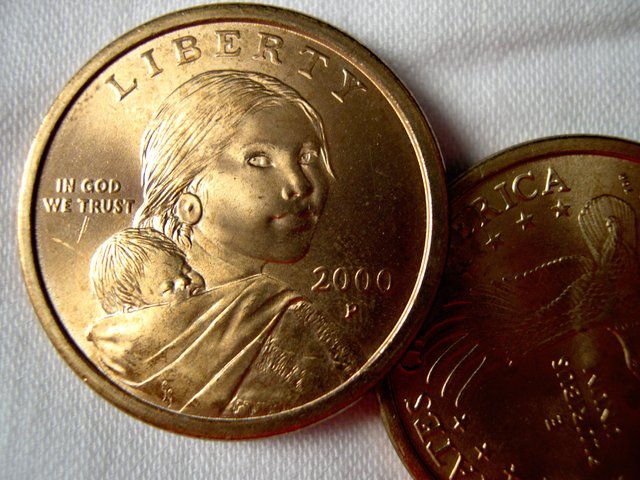From Cowrie to Crypto: A Look at Money from "Thin Air" (or Steem, as it were)
Gold's worth was at one time measured in cowrie shells.
~*~
~*~
I have a friend. This friend says that cryptocurrencies are not money, but counterfeits, and in general, Ponzi schemes.
This friend maintains that:
In economics money is defined exclusively (a la Hoppe via Menger) as the most saleable (readily exchangeable across time and place) good, which no crypto is, as of yet, and that
Cryptocurrencies are therefore not money, and are thus "counterfeit," illegitimate non-monies.
Finally, my friend claims that the global economy would fail should price calculation attempt to be done with a tool that is not the most salable good, thus it is unethical and and would be illegitimate to attempt to create new price calculations voluntarily, not based on the price ratios established by gold exchange over thousands of years.
Is gold "intrinsically valuable" ?
No. Economically speaking, it is not. As per the Subjective Theory of Value, gold is only as valuable as the value-er deems it to be.
To expound:
The subjective theory of value is a theory of value which advances the idea that the value of a good is not determined by any inherent property of the good, nor by the amount of labor necessary to produce the good, but instead value is determined by the importance an acting individual places on a good for the achievement of his desired ends.[1] The modern version of this theory was created independently and nearly simultaneously by William Stanley Jevons, Léon Walras, and Carl Menger in the late 19th century.[2]

Don't get me wrong. I believe gold will always be extremely valuable, and think it has unique strengths that cryptocurrencies do not. That said, I am but one market actor, and see value in both the modern, and more primitive side of the "coin."
Hoppe's utopian vision.
My friend who insists that anything that is not the most salable good in any given economy is inspired heavily by the writings of Hans Herman Hoppe. Hoppe maintains:
Empirically, of course, the commodity that was once chosen as the best-because-most-universal-money is gold. Without government coercion gold would again be selected for the foreseeable future as the commodity best performing the function of money. Self-interest would lead everyone to prefer gold—as a universally used medium of exchange—to any other money.
I tend to agree with Hoppe here. It makes sense. Gold is, in the global economy in which we live, the most salable good. As such, self-interested market actors will tend toward abandoning other less salable monies for gold. Where I take issue with this is in the following expression, also from Hoppe:
Strictly speaking, a monetary system with rival monies of freely fluctuating exchange rates is still a system of (partial) barter, riddled with the problem of requiring double coincidences of wants in order for (some) exchanges to take place. The existence of such a system is dysfunctional of the very purpose of money. Freely pursuing his own self-interest, man would immediately abandon it...
~Hans-Hermann Hoppe, The Review of Austrian Economics (1990)
I wonder if Hoppe could envision at the time of writing this that some progressively more and more salable goods called "cryptocurrencies" would, in the near future, function simultaneously as money and as various and unique information services. To my view "rival monies" are not necessarily a bad thing, or illegitimate, as this notion precludes the idea that some individual market actors may discover or develop a commodity they prefer to gold (subjectively valuing it more) and then eventually establish a new market norm by sharing this discovery with others and effectively lowering demand for other presently more salable monies/commodities. While this may seem unlikely now, it also seemed highly unlikely thousands of years ago that any fool would trade his precious cowrie shells for some "worthless" gold.
I really struggle with this, because in so many ways my friend's (and Hoppe's) logic is bulletproof. Gold is the most salable good, and market actors are always seeking to overcome the requirement of a double coincidence of wants ("I have a sofa you want, and you have a bed I want") to successfully exchange in the market place. Money allows for this ("I don't need your bed, and you still want my sofa, but we have this thing called "money," so we can still transact). The problem is, though the logic is bulletproof, my friend's argument is also airtight. I'll explain what I mean by that later.

Two beautiful women, dressed in money.
Menger vs. Hoppe.
I quote Carl Menger in his essay "On the Origins of Money":
When the relatively most saleable commodities
have become “money,” the great event
has in the first place the effect of substantially
increasing their originally high saleableness.
Every economic subject bringing less saleable
wares to market, to acquire goods of another
sort, has thenceforth a stronger interest in converting
what he has in the first instance into the
wares which have become money. For such
persons, by the exchange of their less saleable
wares for those which as money are most saleable,
attain not merely, as heretofore, a higher
probability, but the certainty, of being able to
acquire forthwith equivalent quantities of every
kind of commodity to be had in the market.
~Carl Menger, On the Origins of Money, pg. 39
This is all well and good, and makes a lot of sense. Hoppe follows up on this by asserting that finally the most saleable good in the global economy is gold. All true.
But why is it "counterfeiting" or a "Ponzi scheme" when some new commodity emerges in the market, which individual market actors voluntarily choose to utilize as a "relatively most saleable" means of exchange?
The reason I view Hoppe's prescription as slighlty dogmatic and "utopian" is because it seems to occur in a vacuum. The market is an ever-evolving and ever-changing open-air affair. It's in a constant state of flux. Menger uses plural forms in his illustration:
When the relatively most saleable commodities have become "money"...
Was Menger saying that there could be multiple legitimate monies in any given economy, or that this was simply a stage in the progress towards one most saleable money? The latter makes total sense. Indeed, it is the only logical conclusion one can draw. However, it is my view that this evolution toward the "unicorn" of currencies, is unending, simply because as long as we individual actors live and exist, a changing list of wants, needs, and unique situations is unending.
The most saleable good will always be the most advantageous to an individual market actor in any given market place. What Hoppe ignores, however, is that Menger referred to "relatively saleable commoditieS" (emphasis mine) as "money." He did not refer to them as counterfeits (as does my friend) or "dysfunctional" (as does Hoppe).
He doesn't delegitimize this stage of market evolution by referring to these highly saleable market goods as "counterfeit" or "fake." Hoppe's vision seems to require an end without acknowledging the myriad paths the market may or may not take to arrive at any one potential "end." To say that gold will always be the most saleable good would be to claim prescience and a knowledge of the future.
My friend said I was accusing him of this, and that it was a strawman. I was not accusing him of this, per se. He has acknowledged directly and in no uncertain terms that the most saleable good on the world stage can change. My issue with my friend's argument is not about gold being the current most saleable good. It is about taking into account time and change when discussing market legitimacy.
.jpg)
The Market in Flux.
My friend's claim that gold is currently the most saleable good in the global economy is right on. His claim that cryptocurrencies (by virtue of not being the most saleable current goods on the world market, whilst simultaneously "posing" as money) are "counterfeits," is not right on. The reason? Time and change.
Change can be defined as action over time. While crypto coins are not the most saleable good today, there is no way of knowing if they will or will not be in the future. However, by saying categorically that these coins are "counterfeit," my friend implicitly claims foreknowledge of future market conditions. How? Well, how did gold emerge as the most saleable good on the world stage after our beloved cowrie shells? By market action occurring over time. How ridiculous it would have been if someone had said at the advent of gold in an ancient market dominated by shells "This shiny metal is just COUNTERFEIT! IT IS NOT THE MOST SALEABLE GOOD!"
Hasty proclamations like that of my friend shoot the market in the foot, effectively rendering it a static display, enclosed in glass. Gold emerged and became the most saleable good on the world stage, through a process of working it's way through disconnecting, micro-economies, and gaining popularity even in those economies where it was not yet the most saleable commodity. To say that Bitcoin, or any other cryptocurrency is "counterfeit" simply because it has not attained to the level of "most saleable good" is presumptuous at best, and totally absurd, economically speaking, at worst. People are valuing crypto tokens subjectively, just as they valued gold. It is an exercise in futility and human hubris to attempt foolishly to dictate what people will or will not value freely in the market, via a narrowly defined set of inflexible terms and turns of semantics.
Gold's worth was at one time measured in cowrie shells.
People at that time used gold as money while simultaneously cowries were used as money.
Both were legitimate. The market (and in some cases,government coercion) spoke. Gold won out.
According to my friend's criteria for money (only the most saleable single good in the global economy), at that time gold should have been labeled "counterfeit."
The market IS flux.
We may be one day using something currently beyond conception for market price calculation.
To shoot the market in the foot, and claim that any one person "knows best" for the rest of the individual actors is a decidedly anti-market concept.

So, in the end, was gold a Ponzi scheme which ultimately favored early adopters because of the market's inevitable, soon-to-happen reversion to sea shells for currency in the wake of the "gold crash"? Is Steem "counterfeit" because it is measured in dollars, currently? In true free market fashion, I'll leave you to evaluate that.
~KafkA
(One final aside before bringing this to a close. It has been argued that because of the requirements set forth by Ludwig Von Mises in his Regression Theorem, cryptocurrencies cannot, by definition, be money, as they had no exchange value as barter commodities prior to becoming classified as a "money." Oddly enough, things like Bitcoin are still valued by the market, regardless of the prescriptions of this theorem, which calls at least this aspect of Mises' criteria into question. Further, it could also be argued that certain crypto tokens do have value outside of their monetary function, as barter goods, when one considers innovative technologies such as the MaidSafe SAFE net, in which MaidSafe Coins are the algorithmic tools by which one procures storage space in decentralized computer networks.)
OTHER RESOURCES
Historical information on cowrie shells:
http://www.nbbmuseum.be/en/2007/01/cowry-shells.htm
https://climbcarstensz.wordpress.com/2013/08/02/cowrie-shells-more-than-simply-shell-money/
http://5555marinedrive.com/the-amazing-history-of-cowrie-shells-you-probably-never-heard-of/
Brief history of gold coinage:
Graham Smith is a Voluntaryist activist, creator, and peaceful parent residing in Niigata City, Japan. Graham runs the "Voluntary Japan" online initiative with a presence here on Steem, as well as Facebook and Twitter. (Hit me up so I can stop talking about myself in the third person!)



There it is!
I fully agree with you. Of course cryptocurrencies aren't illegitimate. How could they be if both parties agree to using them?
One thing I don't understand is the notion that the most saleable good becomes money. What is saleable? What I always learned is that money should have three functions:
Gold has all these functions, but so do cryptocurrencies.
Besides, at a given point in time people started preferring silver over gold, because gold is so much more valuable that you can only do large transactions with it. I've seen Rothbard writing about this. It's some kind of law but I forgot the name. But anyway, gold isn't always the money that people preferred. It's been sea shells, silver, sometimes even grain, and maybe in the future it will become crypto! But the most important thing is that people should be free to choose any instead of having a government/central bank to tell them what they should use. Now THAT is counterfeit ;-)
Excellent points, and couldn't agree more! I also define "money" as you do, but was duly informed this was a "wrong definition" by the acquaintance I mention in this post. Ah well....
The most saleable good definition also makes sense to me, as a way to distinguish "money" from barter good, but those lines get blurred so often I just don't see the point in making a religion out of it.
I think some of my fellow Austrian's misunderstand some things. One aspect of money that I believe Mises touches on in "The Theory of Money and Credit" is that something that is the most saleable becomes money because what makes it saleable is a use for the good outside of being a medium of exchange. At least this is my understanding.
So gold has a use outside of the use of money. It can be used in electronics and manufacturing as well as in jewelry, luxury items, apparel, clothing, etc. It has a use outside of its use as money.
Things like bitcoin, steem, and other crypros, I would argue, have very interesting uses outside of money. They are great, low cost, digital payment methods that are cheaper and more efficient than say traditional methods (credit cards and the like).
There for, they arise spontaneously with a usefulness outside of being just a medium of exchange which doesn't make them fiat or anything like that.
Right. It arises first as a barter good, right? Chris has just blocked me on faceplant now, which makes me a bit sad, and wish I had been a little more careful with my words. Anyway, all I wanted to ask was, according to his definition, wouldn't even gold have been considered a "counterfeit" in the age of the cowrie shell?
I agree with you that with the position your friend put forward in respect to bitcoin being counterfeit he would have to admit that you are correct that gold during the shell era would have been the counterfeit.
Let me post a different take on money itself.
The only thing that could be money is your own personal time. Your time is divisible (hour here hour there), it is valuable from a finite perspective (aging), it is transferable (could be a service you exchange, or procurement of material for exchange), it could be physical production or mental production. I think it meets the criteria of being the most saleable commodity that any person really truly owns.
Geeze. Yeah. That's pretty interesting. And really, time is required for the procurement of any service. Time and health are basically everything, no?
Time and health really are everything. Those are the most finite things on the planet also. IMO. When you are done here nothing comes with you lol.
Really if you boil down every transaction the base material is the time you spent to be involved in the exchange. The time could be worth more if you spent an hour mining gold (and then traded the gold) as compared to an hour raking someones leaves in exchange for currency. The amount you receive from the exchange would be the reflection of the free market rate the exchanged goods or services. The free market pricing would probably lead smart and ambitious people to "spend" their time doing higher yielding activities.
I've faced this problem with friends too where they say that cryptocurrencies are Ponzis - I think time will prove them wrong.
Right. Me too. I understand thinking there are some scam coins out there (their definitely are), but just that blanket judgement, "I don't know so I don't care," every single cryptocurrency is a scam, kind of attitude (a lot like the one you mentioned in your latest post) is just such a dead end.
Absolutely. Sadly those people will realise too late.
@kafkanarchy84
You've done a lot of research on this and it is clearly evident... even if some don't agree.
Scarcity & Security, as I see it, are what attract investors to certain types of currencies.
Cheers, @breakingtonight. I agree for sure about scarcity and security. Read your blog description and it sounds interesting. Following!
@kafkanarchy84
Nice to hear from you! Thanks so much for the follow! I really appreciate it! :)
Thanks for this interesting read.
Cryptocurrencies in my mind are just like gold or silver in their infancy. To brand the illegitimate or counterfeit is short sighted at best.
I agree.
Your friend's narrow minded views are going to cause him to miss out, it seems. Blindly following thinkers of the past who had no concept of value completely detached from physical form is just willful ignorance of the information we all have free access to. The most saleable good is the one that can be transferred around the world in the blink of an eye, that is accessible to anyone.